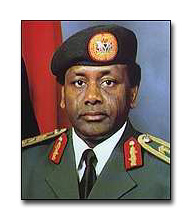

Late Gen. Sani Abacha
Related Link: Abacha's Last Days
|
Abacha, Sani After annulling the results of a democratic presidential election in which wealthy publisher Moshood Abiola was the apparent winner, Babangida transferred power to a transitional government in August 1993. Abacha overthrew the transitional administration in November and installed himself as head of state. He abolished all state and local governments and the national legislature, banned all political parties, and replaced many civilian officials with military commanders. He named an 11-member Provisional Ruling Council, consisting mainly of generals and police officials, which would oversee a 32-member Federal Executive Council. The executive council included prominent civilians and some pro-democracy activists and was created to head government ministries. In January 1994 Abacha presented a budget that abandoned market reforms instituted in 1986, making it impossible to negotiate for aid from the International Monetary Fund (IMF). In the face of increasing foreign debt, low industrial output, and harsh autocratic rule, resentment against the military government grew steadily. In response, Abacha announced details of his political transition program, but when the constitutional conference held in May 1994 was widely boycotted by pro-democracy groups, Abacha had the police issue a strong statement affirming that nongovernmental political activity was illegal. In June Abiola proclaimed himself president and was arrested for treason. Civil unrest intensified, particularly in Lagos, and oil workers declared a strike in support of Abiola's release. The strike crippled Nigeria's leading industry, but Abacha clung to power, and the strike ended in September. He suppressed opposition brutally, even within his own camp. Abacha died of a heart attack in June 1998.
. <<< Previous Page | Next President >>> |

Write Your Comment
Search
Nigerian Government
The Federal Republic of Nigeria is governed in accordance with the provisions of a Constitution.In 1914 the Protectorates of Southern and Northern Nigeria were amalgamated with the Colony (Lagos) by Lord Lugard to form what is now known as Nigeria.
Nigerian Music
The music of Nigeria includes many kinds of Folk and popular music, some of which are known worldwide. Styles of folk music are related to the multitudes of ethnic groups in the country, each with their own techniques, instruments, and songs. Listen to music of Nigeria.
